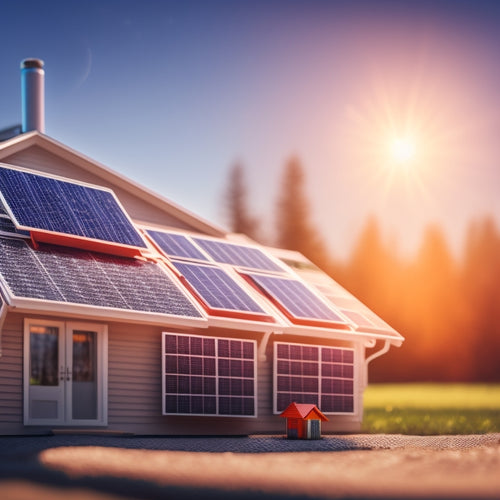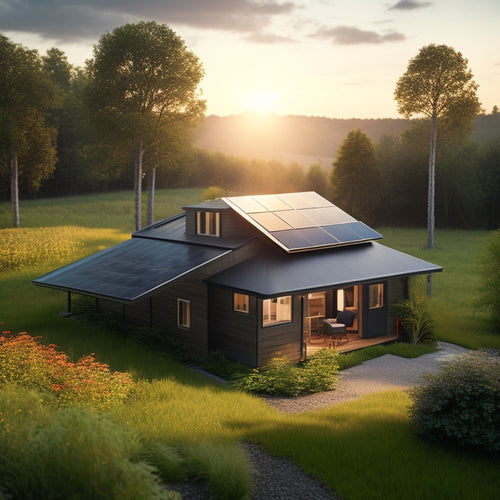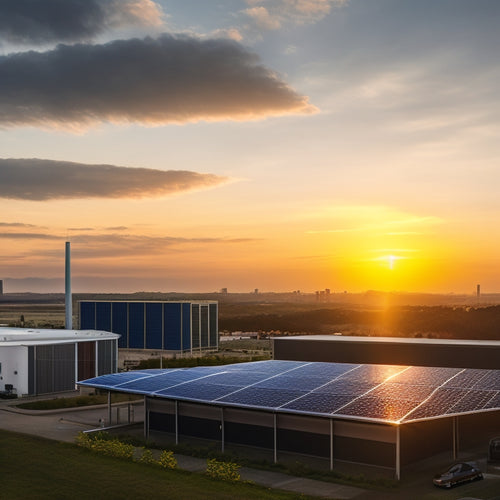
Why Choose Off-Grid Renewable Energy for Your Home?
Share
By choosing off-grid renewable energy for your home, you're taking an essential step towards minimizing your carbon footprint, reducing your reliance on fossil fuels, and embracing a sustainable lifestyle that benefits both your wallet and the environment. You'll gain energy independence, lower your energy bills by up to 90%, and increase your property's market value. Plus, you'll reduce air pollution, protecting human health and the environment. By embracing off-grid renewable energy, you're investing in a cleaner, more sustainable future. Now, discover the specific benefits that await you in each aspect of your off-grid journey.
Key Takeaways
• Off-grid renewable energy reduces your carbon footprint, promoting a climate-conscious lifestyle and minimizing environmental impact.
• Achieving energy independence at home provides security, autonomy, and peace of mind, preparing you for emergencies and power outages.
• Off-grid renewable energy significantly lowers energy bills, with potential savings of up to 90%, and enables real-time monitoring of energy production and consumption.
• Integrating off-grid renewable energy systems can substantially increase your home's market value, making it more attractive to potential buyers.
• By choosing off-grid renewable energy, you'll reduce your reliance on fossil fuels, decrease air pollution, and protect human health and the environment.
Reduce Your Carbon Footprint
By moving to off-grid renewable energy, you can greatly decrease your carbon footprint, which is essential for mitigating climate change and preserving the environment. As you adopt a climate-conscious lifestyle, you'll reduce your reliance on fossil fuels and lower your greenhouse gas emissions. This shift is important, as climate change poses significant threats to our planet's ecosystem and human societies.
Embracing off-grid renewable energy is a key aspect of a sustainable lifestyle. By harnessing power from sources like solar, wind, or hydro energy, you'll minimize your impact on the environment. Additionally, you'll be promoting energy independence and reducing your reliance on non-renewable energy sources.
This change in energy production will greatly decrease air pollution, protecting both human health and the environment.
Energy Independence at Home
You can break free from the grid and achieve energy independence at home by installing renewable energy systems that meet your specific power needs. This shift towards self-sufficiency not only reduces your reliance on public utilities but also fosters a sense of security and autonomy.
By generating your own clean energy, you'll be better prepared for emergencies and power outages, ensuring your family's comfort and safety. With off-grid renewable energy, you'll develop a self-sufficiency mindset, taking control of your energy consumption and reducing your vulnerability to grid disruptions.
Emergency preparedness is critical in today's unpredictable world, and having a reliable source of energy will give you peace of mind. Imagine having the power to power your home, even when the grid goes down. With off-grid renewable energy, you'll be ready for anything life throws your way.
Lower Your Energy Bills
Installing off-grid renewable energy systems can greatly reduce your energy bills by harnessing free, abundant energy from the sun, wind, or geothermal sources. By generating your own energy, you'll rely less on the grid and lower your energy expenses.
Here are some benefits you can expect:
-
Significant Savings: With off-grid renewable energy, you can reduce your energy bills by up to 90%. This can lead to significant annual savings, which can be invested in other areas of your life.
-
Accurate Monitoring: Smart Meters can track your energy production and consumption in real-time, helping you identify areas for improvement and optimize your energy usage.
-
Energy Efficiency: Conducting an Energy Audit can help you identify energy-wasting areas in your home and provide recommendations for improvement, further reducing your energy bills.
Renewable Energy for Rural Areas
Rural areas often lack access to traditional grid connections, making off-grid renewable energy systems an essential solution for powering homes and businesses in these regions. You can harness the power of renewable energy to bring electricity to areas where it was previously unavailable.
Off-grid renewable energy systems, such as solar, wind, or hydro power, can provide rural communities with a reliable source of energy. This not only improves rural accessibility but also enables community engagement and development.
By installing off-grid renewable energy systems, you can power homes, schools, healthcare facilities, and businesses, promoting economic growth and social welfare in rural areas. Additionally, community-based initiatives can be established to maintain and manage these systems, fostering community engagement and empowerment.
Increased Property Value Potential
By integrating off-grid renewable energy systems into your home, its market value can increase substantially, making it more attractive to potential buyers. This is because sustainable living features are highly sought after in today's real estate market.
As a homeowner, you can reap the benefits of increased property value potential, which can lead to a higher selling price or better resale value.
Here are some key advantages to take into account:
-
Appraisal benefits: Having an off-grid renewable energy system can increase your home's appraisal value, making it more attractive to potential buyers.
-
Marketability boost: A home with sustainable energy features is more likely to stand out in a competitive market, attracting buyers who value eco-friendliness and energy independence.
-
Long-term savings: As energy costs continue to rise, a home with off-grid renewable energy systems can provide long-term savings, making it a more desirable investment for potential buyers.
Frequently Asked Questions
How Long Does It Take to Install an Off-Grid Renewable Energy System?
You'll typically spend 2-6 months on the installation timeline, depending on the complexity of your off-grid renewable energy system and the permitting process, which can take 1-3 months, assuming a smooth approval process.
Are Off-Grid Systems Compatible With Existing Electrical Infrastructure?
You'll find that off-grid systems can seamlessly integrate with existing electrical infrastructure, requiring minimal grid integration efforts and infrastructure upgrades, ensuring electrical harmonization and a smooth shift to renewable energy.
Can I Still Use My Appliances With Off-Grid Renewable Energy?
As you visualize your off-grid home, imagine a seamless blend of energy efficiency and appliance compatibility. Rest assured, you can still use your appliances, enjoying power reliability and efficient daily consumption, with the right system design.
How Often Do I Need to Maintain My Off-Grid Energy System?
You'll need to perform regular system checks and review energy logs to guarantee your off-grid energy system operates efficiently, ideally every 3-6 months, to identify potential issues and optimize performance.
Can I Install an Off-Grid System Myself or Do I Need a Professional?
You'll need to assess your DIY expertise and the system complexity before deciding to install an off-grid system yourself or hiring a professional, as improper installation can lead to safety hazards and reduced efficiency.
Related Posts
-

A Beginner's Guide to Navigating the Solar Investment Tax Credit
You're eligible to claim a significant Solar Investment Tax Credit (ITC) of 30% of total installation costs, but mane...
-

Diy Off Grid Solar
By embracing DIY off-grid solar, you can break free from grid dependence, slashing your energy bills by up to 90% and...
-

Advantages of Commercial Solar Battery On-Site Storage
By investing in a commercial solar battery on-site storage system, you can greatly reduce your energy grid dependence...


